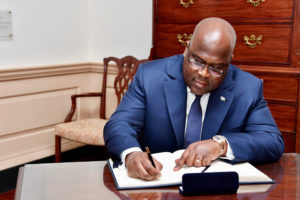On the Hill: DRC President Visits DC
 DRC President Tshisekedi signs US Secretary of State Pompeo's guestbook before their meeting in Washington, D.C., on April 3, 2019. (State Department photo by Michael Gross)
DRC President Tshisekedi signs US Secretary of State Pompeo's guestbook before their meeting in Washington, D.C., on April 3, 2019. (State Department photo by Michael Gross) Recently I was honored to attend an event at the Council on Foreign Relations-DC featuring a presentation by the president of the Democratic Republic of the Congo (DRC), Félix Tshisekedi. President Tshiesekedi assumed office earlier this year following an election marked with controversy and allegations of electoral fraud on both sides, allegations Tshisekedi firmly denies.
Much of the Congolese president’s speech was intended to serve as an advertisement to the many US military and business officials in the room, which is why Tshisekedi focused heavily on the potential strategic role of his country in the battle against the remnants of ISIS and other religious extremists in the region. He also talked at length about the bountiful natural resources of his country in a pitch to foreign investors, while also noting the large uranium stores in the DRC (as both an enticement to refinery by the international community and a warning against ignoring the Congo lest the volatile material fall into the hands of terrorists).
Perhaps the most interesting of President Tshisekedi’s remarks was his full-throated promise to re-emphasize the rule of law, end arbitrary criminal punishment, and ensure that religious extremism has no place in either the creation or enforcement of the law in the DRC. Tshisekedi seemed to recognize that a society with a strong emphasis on the rule of law would receive many of the economic benefits he requested from attendees in the room, stating “Once we have reorganized and restructured our government, and we have implemented fully [the] rule of law, along with a more effective judicial system that is more credible, we will finally then be able to be an attractive place for investors.”
This pronouncement was especially significant, as the Democratic Republic of the Congo not only has a large number of political prisoners who deserve freedom, but is currently experiencing an epidemic of accusations of witchcraft against children.
Numerous children, especially in the east of the Congo, have faced allegations of witchcraft by local community and family members, often because they exhibit symptoms of undiagnosed illnesses (such as epilepsy) that are viewed as supernatural by the local community. As a result of these accusations, children are removed from their homes and forced to live on the streets or in orphanages, and some are beaten or even killed.
Presumably, the president’s new focus on the rule of law and ending extrajudicial punishment would include plans to protect these extremely vulnerable children. When I raised this issue with Mr. Guylain Nyembo, the chief of the president’s cabinet, I was assured that President Tshisekedi is focusing on community education as a means to prevent such incidences and would be studying the issue further.
Unfortunately, such actions won’t be enough to prevent further beatings and discrimination against the supposed “witches,” and I encouraged Nyembo and the president to support legislation that prohibits families from casting their children out of their home because of a witchcraft allegation and would harshly punish those convicted of beating or killing a child because of a witchcraft allegation.
The American Humanist Association will follow up with Neymbo and continue monitoring the situation in the Democratic Republic of Congo to see whether or not President Tshisekedi’s promises regarding the rule of law are realized and children are protected from these enormously destructive witchcraft allegations.
